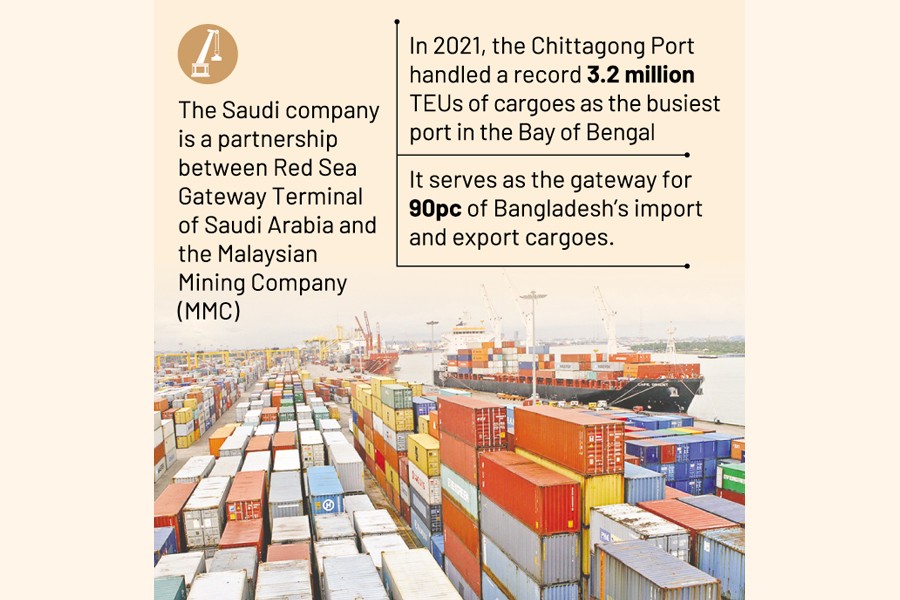Saudi firm to take over Patenga terminal
Riyadh eyes other Bangladesh port contracts too

Published :
Updated :

Bangladesh is set to sign an agreement with a Saudi company on operation, modernisation and expansion of the Patenga Container Terminal (PCT) beside Chittagong seaport, in the first go of Riyadh's port-venture bids here.
The deal with Red Sea Gateway Terminal (RSGT) Company is expected to be signed by November this year, Ambassador Essa bin Yousef Al Duhailan of the Kingdom of Saudi Arabia (KSA) to Bangladesh told the FE Tuesday.
He said that there are no issues regarding this matter as the Ministry of Shipping and the company had multiple rounds of negotiations to finalise the deal.
This effort is in line with the directives of Prime Minister Sheikh Hasina and her Private Industry and Investment Adviser Salman F Rahman, he added.
The Saudi envoy also expressed optimism that the RSGT would secure contracts for operating other port terminals, given their expertise in managing world-class facilities.
According to reports, the Red Sea Gateway Terminal (RSGT) is the newest flagship container terminal at Jeddah Islamic Port. Spearheaded by Saudi Industrial Services group SISCO, it is also the first privately funded BOT (Build, Operate, and Transfer) development project in Saudi Arabia with an investment of $1.7 billion up to 2050.
The Saudi company is an international terminal operator, formed through a partnership between the Red Sea Gateway Terminal of Saudi Arabia and the Malaysian Mining Company (MMC).
A delegation led by State Minister of Shipping Khalid Mahmud Chowdhury visited the head office and operations of the Red Sea Gateway Terminal Company last year.
During the visit, Aamer A Alireza, Vice-Chairman of the Red Sea Gateway Terminal Board of Directors, CEO Jens O Floe and other senior officials of the company presented their plans and investment proposals for the modernisation of the Patenga Container Terminal.
Subsequently, the state minister inspected the container-handling operations at Jeddah Islamic Port.
The Red Sea Gateway Terminal (RSGT) authorities have expressed interest in the modernisation, maintenance and operation of the Patenga Container Terminal in Bangladesh. This interest stemmed from the Memorandum of Understanding signed last year between Saudi Arabia and Bangladesh on Public-Private Partnership.
In 2021, the Port of Chittagong handled a record 3.2 million (twenty-foot equivalent unit) TEU, solidifying its position as the busiest port in the Bay of Bengal. It serves as the gateway for 90 per cent of Bangladesh's import and export cargoes.
The port also plays a crucial role in facilitating the country's rapidly expanding garment trade, one of the largest globally.
According to RSGT officials, the PCT, with its 600-metre quay, will have the capacity to handle three vessels simultaneously. This enhancement will augment the ship-handling capabilities at Chattogram port.
In 2017, the government adopted a 'Policy for Implementing Private-Public Partnership (PPP) Projects through Government-to-Government Partnerships (G2G)'. As part of this policy, the Bangladeshi Ministry of Shipping proposed a plan for the development of the PCT based on the PPP model to the Saudi government. Subsequently, RSGT was nominated as the Saudi investor.
After the primary selection, Gagan Seksaria, RSGT's Director of Global Investments, said the PCT project fits well with Red Sea Gateway Terminal's competencies and its expansion strategy for emerging markets.
"We are very confident that, through this investment, we will be able to contribute significantly to Bangladesh's fast-growing trade and economy," he added.
According to the Asian Development Bank, the strategic location of Chittagong Port makes it a suitable alternative to other ports in the region. However, the bank suggested further work to fully tap into the port's potential as a gateway for third-country trade.
In 2021, RSGT announced the sale of a 40-percent equity stake worth US$280 million to China's Cosco Shipping Ports Limited (CSPL) and Saudi Arabia's Public Investment Fund (PIF), according to reports.
mirmostafiz@yahoo.com


 For all latest news, follow The Financial Express Google News channel.
For all latest news, follow The Financial Express Google News channel.